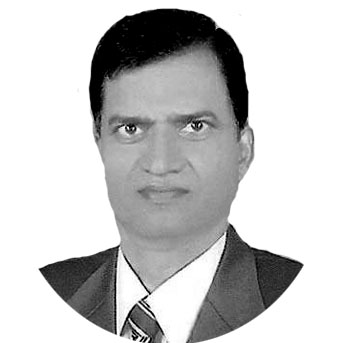Dr Rajkumar Singh
MEASURES like imposing quarantines, enacting new laws to manage the pandemic, using modern tools for e-learning and telework, ensuring a minimum standard of living for all, granting loans, exemptions from paying water and gas bills and taxes, assisting the unemployed, and using the military to assist in security measures during the epidemic have cost countries billions of dollars. These are funds that could have been invested in infrastructure or other major projects, but instead have now been used to respond to the immediate needs of the people. The COVID-19 pandemic touches every aspect of business, technology and society. And stable and effective government is at the heart of managing through this crisis. What we do now will have longer-term implications for the health and safety of our families, our citizens, the economy and even global stability.
Expected political changes: The pandemic will radically change the modern world, leading to three likely outcomes. A new theory will be integrated within political science in the future. Indeed, traditional legitimacies in the systems of government, which are derived from ballot boxes, hereditary legitimacy or religion, are beginning to decline, leaving room for a new theory called the “theory of achievements”. Since the Cultural Revolution of Mao Zedong in the 1960s, China has worked on this emerging legitimacy, as the Chinese Communist Party has distinguished itself from the rest of the Communist parties in the world. The traditional conflict between wrong information and right information will transform into a conflict between convincing information and unconvincing information, as legal arsenals and control tools are no longer effective in the spread and prevalence of correct information. The method of producing information and choosing its dissemination channel is becoming a means of turning it into convincing information, regardless of if it is true or false.The process of monitoring people will transition from external to internal control using smartphones. This is also what happened in China, to curb down on misinformation on Covid-19 during its early stages and as a preventive measure in the absence of a vaccine. These smart devices have become effective tools for measuring citizens’ reaction at home to what is happening in their surroundings.
Changes in human behaviour: Humankind is going through a humanitarian revolution, the kind that has occurred only thrice before: first, after the discovery of fire; second, with the advent of agriculture; and third, following the industrial revolution. The most prominent sign of this ‘fourth revolution’ is the predominance of new technology and the supremacy of modern means of communication, which have spawned a conflict between two major concepts of using the internet. The first can be described as social perception with a human connect, while the second is non-social perception, and can be termed as wild and unbridled. The humanitarian-minded perception is likely to win this conflict, as this human revolution is making its mark on our social existence and old behaviours. This will impact the current value system and will have political and economic implications.The post-epidemic stage will see the emergence of a new human being, whose daily behaviour and thinking will differ from what it was before the Covid-19 outbreak.
The political, legal and economic systems will have to adapt to this new human being. Despite the timely importance of the current safety measures being put into action around the world, there is a great need for these to be integrated into a comprehensive post-pandemic thinking. In fact, we will find ourselves faced with a generation who thinks differently from the pre-pandemic generation. In the light of the impact of Covid-19 on the individual and collective behaviours of society and State, and people’s continued thirst for information, it is necessary to keep in mind the post-pandemic world when it comes to decision-making. The Covid-19 storm will pass and mankind will survive, despite the loss of many lives. Humankind will soon live in a world that is very different from the one before the virus. However, the pandemic will succeed where other movements of the 20th century have failed in their struggle to establish democracy and human rights, and preserve a safe environment for all.
Positive role of private sectors: During times of crisis, governments around the world must act quickly and decisively, even in the face of limited information. Today governments are facing issues of emergency management, continuity of operations and citizen engagement and care. Cognitive assistants and self-service tools can help agencies provide services to help citizens maintain physical and mental health. In addition, mobility tools and infrastructure can ease the intensifying strain on citizen services, coupled with a reduced workforce capacity resulting from work-from-home hurdles and restricted citizen movement. Several tech companies are helping cities and states provide mobility tools to support both government workers and students who have been sent to work from home. Cognitive analytics can also be applied to help governments understand what is happening and to match resources to demand.
As society moves past the immediate response, governments are anticipating the next challenges. They will need to rebuild agencies’ confidence; enable citizens to get back to work; help return the private sector to full output; and shorten the length of the economic downturn. Technology and process transformation have big roles to play in effectively making that happen. Finally, governments will be looking ahead to what the “new normal” will be. They need to re-imagine their business processes and seek better ways to operate, considering a range of requirements. Given the complexity and dynamics of managing through this extraordinary global crisis, the sharpest focus will be on the most immediate societal issues, for which public and private sector collaboration can have the greatest impact. The private sector is stepping up to help governments become more efficient, resilient and robust in performing their missions.
— The writer is Professor and Head, P G Department of Political Science, Bihar, India.










